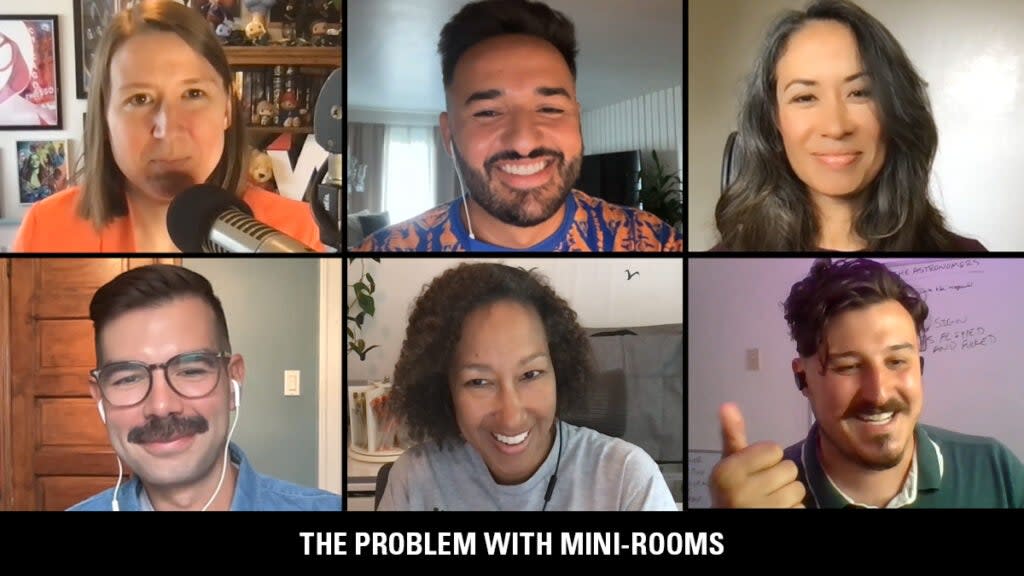WGA Strike Roundtable: TV Writers Say ‘Frustration Boils’ in Mini-Rooms, Especially With Notes ‘From the Algorithm’ | Video

- Oops!Something went wrong.Please try again later.
- Oops!Something went wrong.Please try again later.
You are reading an exclusive WrapPRO article for free. Want to level up your entertainment career? Subscribe to WrapPRO.
One of the issues at the heart of the WGA strike continues to be mini-rooms and the impact they’ve had — and could continue to have — on television shows. But, as WGA members who spoke with TheWrap note, the rooms have an emotional impact on writers, too.
A mini-room is a practice in which a television creator assembles a writers’ room to create multiple scripts — sometimes even an entire season’s worth — for a show, often before the title has even been greenlit. With these scripts in hand, a network or streamer will make a decision as to whether or not the show is good enough to go on.
In our latest strike roundtable, “Roswell, New Mexico” writer Danny Tolli — speaking alongside Dylan Guerra (“The Other Two”), Elaine Loh (“Gossip Girl” and “Dynasty”), Nasser Samara (“Love, Victor” and “iCarly”) and Shelley Meals (“Shadow & Bone”) — noted that “pressure is a good word” to describe the overall atmosphere of those spaces.
“I think that frustration boils to the top a lot in these mini-rooms,” Tolli said. “Television is supposed to be a collaborative medium. When you’re in a writers’ room, you’re bringing forth your own personal experiences that you can then infuse in a show, that’s what makes great art.”
He continued, “And you don’t have time for that in a mini-room. You are there to do the eight episodes very quickly, get everything down so that you can turn it into the studio to get your green light and then put all the work on the showrunner.”
Tolli recalled that one of his “most frustrating experiences” in a mini-room came when, a little over a month into writing the scripts, he and his coworkers were told that the show they were to use as a potential guidepost was no longer trending on X (formerly known as Twitter), and so they had to try something else.
Meals echoed the idea that major greenlighting and tonal decisions are coming from data, rather than quality, saying that the frustration is only heightened when feedback on those scripts doesn’t really feel like it’s coming from a human.
“A lot of times it feels like these notes that you’re getting aren’t even really from the executives, they’re from the algorithm,” Meals lamented. “It was telling them what notes to give? It’s nuts.”
Loh added that the compressed timeline — mini-rooms often only span a few weeks, rather than a traditional writers’ room being up and running for a full season — makes it even harder to deliver good material.
“I don’t begrudge the studios and streamers whatsoever for the fact that they want to make money, but they want to make money from a creative product,” she said. “And so you need that time and investment, not to be just chasing Twitter trends, in order to make a good product.”
Meals also noted that, at the end of the day, material that’s created in a mini-room often doesn’t get to the finish line.
“Of course, it’s going to vary depending on the show. But broadly speaking, given the way that the mini-rooms are separate from production, I think that a great deal of what’s written into any room does not make the final product,” she said.
“So many things are changed based on production issues, scheduling issues, casting studio notes, right up to changes on set,” she continued. “And historically, those were changes that the writer of the episode would be around to see, to understand, to have an opportunity to participate in. It’s a big part of learning how to write for episodic television, and newer writers have really been robbed of that experience.”
Of course, both Guerra and Samara note that it’s difficult for newer writers to even get into a mini-room, and as a result it’s harder to climb the ladder.
Guerra recalled that he had meetings with two showrunners who voiced their desire to hire him but who were waiting on budget approvals. When those approvals came though, they were only allowed to do a mini-room.
“And because I did not have any onset experience, or enough writers’ room experience, I got cut,” he explained. “But also, it wasn’t necessarily like, me, Dylan got cut. The entire title got cut, which I think is important [to] distinguish for people that aren’t super familiar with how writers’ rooms work, specifically with these mini-rooms. We’re losing the titles of staff writer and story editor, in particular.”
You can watch the full panel discussion in the video above.
For all of TheWrap’s WGA strike coverage, click here.
The post WGA Strike Roundtable: TV Writers Say ‘Frustration Boils’ in Mini-Rooms, Especially With Notes ‘From the Algorithm’ | Video appeared first on TheWrap.

